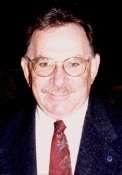
-----
Cleaning with Bugs
Recently, someone mentioned the use of "bugs" or bacteria to clean metal parts preparatory to plating. I know of no such systems in use. Is there anyone who knows if this really exists?
Dave Shirleyaircraft
1998
1997
BioClean has a big article in Metal Forming Magazine for Nov. '97 (metalforming.com) that makes it sound too good to be true but does have some advantages. They list a few locations that are using biological degreasing in an alkaline bath. I don't know anything beyond this article.

Ed Budman [dec]
- Pennsylvania
With deep sadness we advise that our good friend Ed passed away Nov. 24, 2018
Ed:
These things do exist. I have read about them and saw a recent article about one such cleaner that had bacteria that digest the oil that is cleaned off of the parts in a recent issue of Metal Forming magazine. The claims involve almost never having to dump the thing because the oil is digested by the bacteria, so contamination is negligible.
My interpretation of them is that they are normal alkaline cleaners that remove the soils and the bacteria is added to them. The bugs eat the oil over time. The bugs don't do the cleaning, just the cleaning up after the fact.

Craig Burkart
- Naperville, Illinois
1998
1998
Edward,
There is a process named from Blasberg Oberflachentechnik, Germany. After removing the oil from the surface it is "eaten" by bacteria.
If you need more information, please let me know.
Uwe BergerI concur with the observations made by the various contributors. One system I was informed about uses near neutral cleaners, with a lot of surfactants, and the 'bugs' digest the oil and a good bit of surfactants as well, and produces sludge, which is is supposed to be drained/skimmed off periodically. The lost surfactant is made up and cleaning continued - thus providing a virtually non dump operation. There could be limitations on the soils. As I remember chlorinated oils may not be usable here.
R.Sivakumar1997
To the best of my understanding of this technology, it is a complex surfactant chemistry, that is used to soak clean the oils and soluble organics from the metallic surfaces. The pH has to be maintained at a rather tight tolerance - 9-9.3 and temperature maintained at 120 F. The 'bugs'- microbes, are in conventional environment. They are in the air that we breath and on our clothes and bodies. The chemistry, when maintained within the prescribed parameters, creates an optimum environment for these microbes to live in, they eat the oils and the soils that are dissolved in the cleaner.
Eventually these microbes die and settle at the bottom of an external control tank. In over a year of operation, one account reports that the waste from this type of operations can fill a small peanut butter jar, which can be flushed down a commode.
Les Gonsalves- Springfield, Massachusetts
1999
Lambda Bioremediation, of Columbus, Ohio produces natural microbes for removing hydrocarbons from water, soil, and other materials. Lambda uses a combination of many microbes to remove oil. These microbes generally do not die like genetically engineered bugs but rather encapsulate when their job is done. Lambda is best known for cleaning the waste oil from 37 underground storage tanks found during the construction of Jacobs Field in Cleveland.
Michael Friedman- York, Pennsylvania
1999
This is a proven technology, it has been around for at least twenty years in Sweden, and I have been working with "Biological Degreasing Systems for more than 11 years now.
Mikael Norman- Connecticut
1999
I have been manufacturing a line of microbial products that can be applied in parts washers, soil, septic tanks, spill response, applications in water and tank cleaning in the petrochemical field.
Warren Squyres- California
1999
Q, A, or Comment on THIS thread -or- Start a NEW Thread